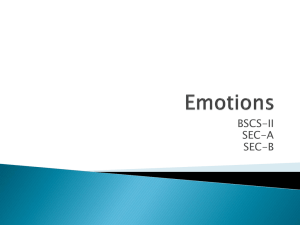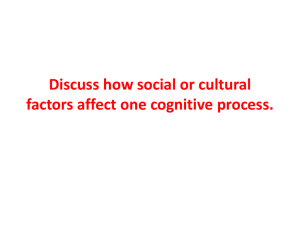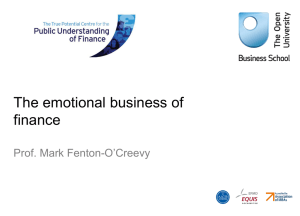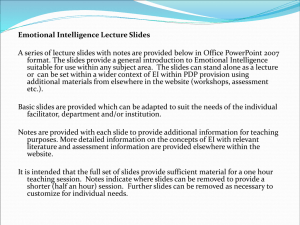Beyond the Physical: Facilitating Emotional Change in an Emotion
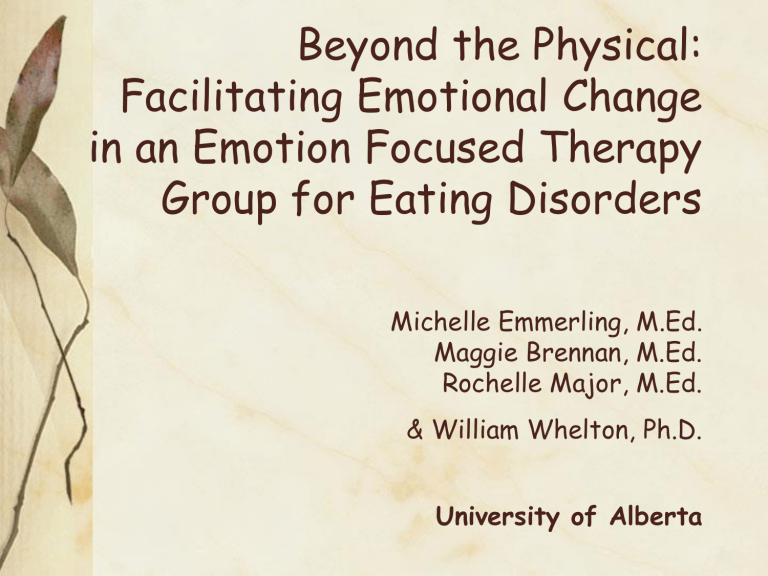
Beyond the Physical:
Facilitating Emotional Change in an Emotion Focused Therapy
Group for Eating Disorders
Michelle Emmerling, M.Ed.
Maggie Brennan, M.Ed.
Rochelle Major, M.Ed.
& William Whelton, Ph.D.
University of Alberta
Shift Focus Toward
Emotion in Treatment
EDs one of most difficult to treat (Halmi et al.,
2005)
New approaches showing promise need to be developed (Wilson, Grilo, & Vitousek, 2007)
More recent shift away from pure CBT
Overall global deficit in emotional processing
Building off recent work of Dolhanty & Greenberg
(2007) – Applying EFT to EDs
Beyond the Physical Symptoms
Researchers and treatment programs have defined recovery using mostly biological criteria (weight gain; regular menses)
Leads to weak index of overall status
“Objects of intervention rather than… the subjects of experience” (Wampold & Bhati,
2004, p. 568)
“How can I fix something when I don’t even know what the cause of it is?”
(Federici & Kaplan, 2008)
Emotions and Eating
Disorders
The eating disorder is a way to avoid painful feelings
AN: Restrict to numb feelings
BN: Binge eat pushes down feelings, while vomiting/laxatives/exercise purge emotions
BED: Binge eating comforts and soothes
Problem with not Addressing
Emotion in Treatment
High rate of relapse - emotions are released during the weight restoration process
No longer able to use ED as a coping mechanism overwhelmed by emotion
It may be that they want to recover but…
“When I get too wrapped up in an emotion of fear, anxiety or sadness – that’s when I blunt those feelings and use my ED to feel better… more control over my emotions and life”
“Genetics makes the gun of EDs and cultural and familial environment load it, but it takes the experience of unbearable emotion to pull the trigger”
Aimee Liu (“Gaining”)
Why Treatment is so Scary…
Emotions come flooding back with weight restoration or with loss of binging/purging
With loss of ED coping mechanisms, these individuals become overwhelmed with emotion
At risk of relapsing if they cannot deal with emotions returning (Federicci, 2004)
“I’d rather die than feel”
“You have got to feel it if you want to heal it”
Emotion-Focused Therapy
Emotions take a central role
Emotions are adaptive & associated with action tendencies
Emotions can become dysfunctional or maladaptive - become associated with negative learning experiences
Difficulties with emotion regulation
EFT – Individual (Process -Experiential)
Client-Centered Relational Base/ Experiential presence (empathy, genuineness, unconditional positive regard).
+
Task Interventions introduced at markers (verbal client indicators) aimed at transforming maladaptive emotions and replacing them with primary adaptive emotions.
Chair Work
Chooses to “work on integrating AN part into rest of me”
In two-chair task addresses AN/Critic part
“I feel like I’m talking to a child, like you can stay but you have to play nice…I know you meant well and you tried to protect me.”
In empty-chair (unfinished business)
Initiates unfinished business with mother
“I know you did the best you could but it wasn’t the right way for me, and now we need to do things my way.”
“If you can tolerate that you can stay, but it needs to be on my terms”
Self-Interruptive Splits
Blocking aspects of self - avoid feeling emotions
Purpose of the Group
Group Format
13 weeks; meet once per week for 2 hours
Week 1
Group preparation
Psychoeducation
Weeks 2 – 13
Chair work
Homework
Our Participant Sample
6 female participants
3 suffering from anorexia (B/P subtype)
1 suffering from bulimia
2 suffering from binge eating
Treatment History of our
Sample
AN clients – history of hospitalizations; individual counselling
(CBT focus)
BE – support group ED treatment only
Medications currently or in past
A Typical Group Session
Check-in (triumphs and challenges)
Review homework
Introduce information/new concepts/skills
Identify areas to work on
Two-chair work
Debrief chair work (processing and meaning making)
“Mini pieces of chair work”
Assign homework
Concepts Covered
The functions of eating disorders
Stages of change
Relaxation training
Learning to attend to & label physical sensations/emotions
Mindfulness
Distress Tolerance
Affect Regulation
Self-Critic and the Seductress
2 – Chair Work
Individual work at the front of the room
Return to seat and debrief
Group Feedback – reactions or similar experiences
Typically 1 to 2 segments per session
Opening Two Chair Work to the Group
“It’s unsettling to see how harsh I am with myself”
HOMEWORK FOR THE
FINAL SESSION
“We are asking you to write a letter to your critic. This can be as long or as short as you like and is a letter letting your critic know what you have learned about it while being in the group, what you hope for your relationship with it (if any), and what you are wanting to let it know about your work in the group…”
THEMES IN THE
LETTERS
1.
Separation of the critic and the experiencing self
Dear Critic…
“Having just written the greeting line, I realize that I need to acknowledge a very important part of my learning through the ED group: the very fact of addressing a letter to you means that I am acknowledging your existence. Yes, you exist as a distinct entity with your own unique voice – inside my head. You are part of my consciousness and mind – and yet you are separate. At least, I have been learning to separate your voice from my other voices and layers of my identity. You have claim to a certain part of my mind, and you have your view and perspective. But, they are just views and opinions, as much as I fall victim to believing they are objective, real and true.”
2. Recognition of the critic’s harmful nature
Dear Critic…
“Your criticism is often so extreme – you do not just speak but nag, yell, sneer, and denounce, reducing me to an amalgam of deep and incurable flaws, and depriving me of any ability and will to acknowledge and validate my worth. Why being so ruthless and mean? Just remember all those times when your harshness was so overpowering that I was not able to get out of bed, or went breathless, or nearly fainted! Why, again?
”
Dear Critic…
“You have tried to convince me that your representation of events is ‘hard fact’ or ‘reality’ rather than just one possible version of things. Your version has been particularly unkind, vicious even. But as I’ve talked with you I’ve begun to see your version of things doesn’t always make sense – in fact, it borders on nonsensical.”
3. Recognition of the critic’s protective function
Dear Critic…
“Despite all that you’ve taken from me, I’ve also come to realize that at other points in my life, you probably saved me. You gave me a voice when I lost mine and allowed me to cope, albeit in a destructive way, with extremely difficult situations.”
4. Accessing primary emotions
Dear Critic…
“Telling me I shouldn’t eat that chocolate bar because it has no nutritional value and is only harmful to my health is great. Telling me to eat it because I’m useless and have no hope anyway, and then telling me I’m useless and have no hope because I ate it…well to that I can now say, ‘fuck off.’
Your criticisms have created the conditions under which I have struggled, the constant questioning and hesitating, and then you have turned the blame back on me by convincing me it is only evidence of my lack.
In this way, you have been entirely counterproductive. And again, to that I can now say, ‘FUCK OFF!’”
Dear Critic…
“I’m finally starting to be able to see how much you have lied to me, and, although I am still very uncomfortable with the idea of anger or expression of anger in general,
I must say that there have been a few times over the past four months that I have felt SO mad at you for deceiving me in so many ways and for distorting my view of what life is and can be.”
5. Negotiation and need identification
Dear Critic…
“I can still hear you right now laughing at me, because even though my glorified view of anorexia as success has shifted, I still feel compelled to follow its rules. You’re saying, ‘what does it matter if your view of it has shifted, if it’s not going to effect a change in your behaviour?’ You need to realize that it DOES matter. That just because the behaviours haven’t magically disappeared, my experience of them is so much different in a way that will hopefully facilitate the process of wanting-to-want to let them go.”
Dear Critic…
“Give me space, time, and opportunities to acknowledge and validate who I am and what I have done, even take pride in what I have achieved. I do need this foundation of selfacceptance and balance. It would strengthen my hope and confidence in myself and empower me to keep trying, growing, and living a fuller life. Don't be afraid for your own existence: you will always have a role and purpose in my life, as there is always room to grow and improve – I am not trying to expel or extinguish you, but let us share my life more equitably.”
6. Finding strength in numbers (the power of the group)
Dear Critic…
“As I understood where others were coming from it made me empathize with their plight and because I was part of the group, it started to soften my own self belief. I have been inspired by their bravery when they've risked and done something good out of the eating disorder pattern. I have been inspired with the life circumstance people come from and are still in, and along with an eating disorder they are still fighting for themselves. What strength.”
Post group Feedback:
Overall
“
There isn’t one piece of chair work that I didn’t learn something from about myself and my own situation.”
Post group Feedback:
Identified Changes
“It shifted my thinking, it showed me my feeling side clearer, it showed me my humanity, it helped me to be more self-forgiving and gentler in my criticism”
